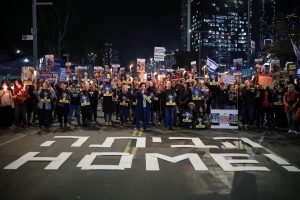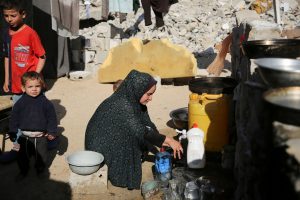Israel and Hamas have agreed to a ceasefire deal after 15 months of grim and bloody war. Gaza has been left in wreckage and in desperate need of humanitarian relief.
The death toll from the ongoing Israeli military offensive is almost 47,000 and more than 110,000 people have been reported wounded. Only 17 out of 36 hospitals remain partially functional. Over 1.8 million Palestinians face “extremely critical” levels of hunger, according to an October UN report, with 70% of crop fields destroyed and much of aid into the enclave blocked.
When the war started the Israeli government tightened its preexisting blockade on Gaza, restricting the entry of food, medicine, medical supplies, fuel, and tents. According to the Norwegian Refugee Council, this blockade has dire consequences: 83% of needed food aid, 65% of insulin, and half of the required blood supply are unavailable in Gaza. Hygiene items have dropped to just 15% of their availability in September 2023.
In December, Human Rights Watch accused Israel of committing acts of genocide and extermination in Gaza by depriving its Palestinian population of access to clean water. In a detailed report, the rights group claimed that these policies have led to the deaths of thousands of Palestinians and amount to crimes against humanity.
The UN Integrated Food Security Phase Classification (IPC) has stated that only broad access to food, medical supplies, water, and essential services would prevent Gaza from sliding into all-out famine.
The ceasefire agreement between Israel and Hamas reportedly allows 600 humanitarian trucks to enter Gaza daily. The Hamas Media Office states that at least 1,000 trucks are needed daily to meet basic needs.
Aid organizations have emphasized the critical need for “unimpeded, sustained humanitarian aid” in addition to long-term solutions.
The Norwegian Refugee Council called on Israel “lift all restrictions on aid and humanitarian agencies to avert famine-like conditions and ensure access to shelter, food, and medical care for all in need”.
Action Against Hunger highlighted the inadequacy of the 600 aid trucks per day saying it was “far from enough to feed a population on the brink of famine”.
OXFAM urged a permanent end to hostilities, accountability for atrocities, and the lifting of the blockade; and the International Rescue Committee reported alarming malnutrition rates among children under five and called for immediate humanitarian aid to avert famine-like conditions.
Omar Shakir, Israel and Palestine director at Human Rights Watch, described the ceasefire as a critical moment to address Gaza’s suffering, and called on Israel “to lift its blockade, allow in humanitarian aid at scale necessary to meet urgent needs, and ensure basic services like electricity and water are restored. Otherwise, people will continue to die, ceasefire or not.”
Shakir also demanded accountability for “heinous crimes” through the International Criminal Court. He stated, “To avoid further mass atrocities, there must be an end to systematic repression and respect for the rights of all people in Israel and Palestine.”




